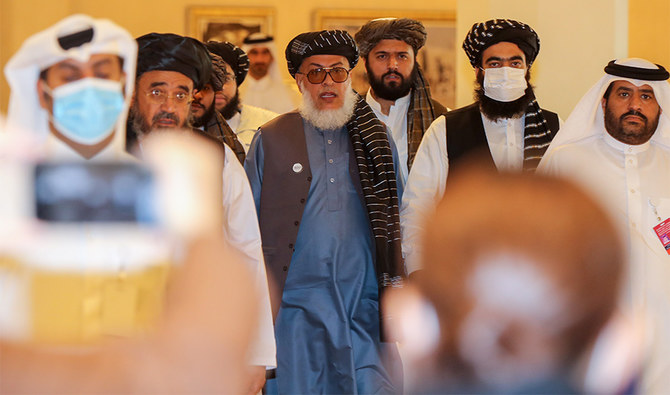ISLAMABAD/KABUL: A Taliban spokesman said on Monday Afghan government representatives and officials from the insurgent group were due to resume peace talks in Qatar today, Tuesday, after a three-week break but there was no final agreement yet on what would be on the agenda.
Afghan government negotiators are expected to push for a permanent cease-fire and to protect the existing system of governance, in place since the ouster of the Taliban in 2001 by a US-led invasion in the wake of the September 11 attacks.
“We are ready and there is no problem on our side to start the second round of the negotiations,” Taliban political spokesperson Muhammad Naeem told Arab News on Monday. “Both sides had exchanged lists of proposals before the break and there has been no agreement yet as to what items will be on the agenda.”
“Both sides will now decide specific topics for the agenda,” he said, adding that a cease-fire would be on the agenda in accordance with the Doha agreement signed between the Taliban and the United States in February.
“Cease-fire will be discussed but when, how and where — this will be decided by both sides,” Naeem said, adding that the Doha agreement, which is a base for the ongoing intra-Afghan negotiations, had been accepted by the United Nations and the international community.
Zabihullah Mujahid, another Taliban spokesman, confirmed to Arab News that Taliban delegates were in Doha and ready to begin talks, but declined to give details on the agenda of the discussions.
The first direct talks between the warring sides opened in September after months of delays, but quickly became bogged down by disputes on the basic framework of discussions and religious interpretations.
The negotiations follow a landmark troop withdrawal deal signed in February by the Taliban and Washington, which saw the US pledge to pull out all foreign forces from Afghanistan by May 2021.
The talks between the Afghan government and the Taliban have also been undermined by an increase in violence, particularly a new trend of high-profile targeted killings of officials, activists, and journalists.
The deputy governor for Kabul province, five journalists, and a prominent election activist have been among those killed in Kabul and other cities since November.
Despite the spate of killings, deputy of the High Council for National Reconciliation, Maulvi Atta ur Rahman Saleem, told Arab News the government team was coming to Tuesday’s talks in “good faith.”
“We have given them [Taliban] full powers to resolve any problem in the negotiations,” he said. “We will cooperate with our team. The government team would try its best to make the negotiations result-oriented.”
“We had meetings with over 86 different strata of the society and our fundamental goal was to seek consultation of the people and act on the basis of the people’s consultation,”
State Minister for Peace Affairs, Sayed Saadat Mansoor Naderi, told reporters at Kabul airport ahead of the departure of the government team for Doha that the team had consulted with “86 strata of society” on the agenda of upcoming talks.
“People’s prime demand, that of the authority of the presidency and the National Reconciliation Council is cease-fire…and when we return to Doha, we will act on the basis of the demand of the people,” Naderi said.
Spokesperson to the Afghan High Council for National Reconciliation, Faraidoon Khwazoon, said in Kabul the government’s negotiation team had met the chairman of the Council, Dr. Abdullah Abdullah, on Monday ahead of their departure for Doha.
“We are going to the second round of negotiations with full confidence to secure peace,” head of the government team, Masoom Stanekzai, said in a statement. “The overwhelming support of the government and the nation is vital for us.”
Stanekzai told reporters at the airport: “The hope is that both sides of the negotiation reach a result that represents the demands of the Afghan people”.
The team also met President Ashraf Ghani in Kabul on Sunday who “assured full support of the government to the negotiating team and wished them success in the next round of peace talks.”
US Special Representative for Afghanistan Reconciliation, Zalmay Khalilzad, who met Pakistani Army Chief General Qamar Javed Bajwa in Rawalpindi on Monday, said he had returned to Doha with “expectations that the parties will make tangible progress in the next round of Afghanistan peace negotiations.”
“Both sides must demonstrate they are acting in the best interest of the Afghan people by making real compromises and negotiating an agreement on a political settlement as soon as possible and an immediate significant reduction in violence/cease-fire,” Khalilzad tweeted.
















